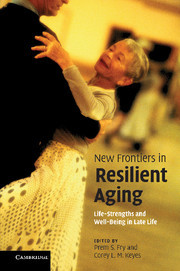Description
New Frontiers in Resilient Aging
Life-Strengths and Well-Being in Late Life
Coordinators: Fry Prem S., Keyes Corey L. M.
This volume looks at human aging from a positive perspective, examining how older adults can exploit psychological strengths to enhance life satisfaction.
Language: English
Subject for New Frontiers in Resilient Aging:
New Frontiers in Resilient Aging
Publication date: 01-2013
Support: Print on demand
Publication date: 01-2013
Support: Print on demand
New frontiers in resilient aging: life strengths and wellness in late life
Publication date: 07-2010
388 p. · 15.8x23.5 cm · Hardback
Publication date: 07-2010
388 p. · 15.8x23.5 cm · Hardback
Description
/li>Contents
/li>
A typically pessimistic view of aging is that it leads to a steady decline in physical and mental abilities. In this volume leading gerontologists and geriatric researchers explore the immense potential of older adults to overcome the challenges of old age and pursue active lives with renewed vitality. The contributors believe that resilience capacities diminishing with old age is a misconception and argue that individuals may successfully capitalize on their existing resources, skills and cognitive processes in order to achieve new learning, continuing growth, and enhanced life-satisfaction. By identifying useful psychological resources such as social connectedness, personal engagement and commitment, openness to new experiences, social support and sustained cognitive activity, the authors present a balanced picture of resilient aging. Older adults, while coping with adversity and losses, can be helped to maintain a complementary focus on psychological strengths, positive emotions, and regenerative capacities to achieve continued growth and healthy longevity.
Foreword John W. Rowe; Introduction; 1. Sources of human life strengths, resilience and health Prem S. Fry and Dominique L. Debats; 2. Growth isn't just for the young: growth narratives, eudaimonic resilience, and the aging self Jack J. Bauer and Sun W. Park; 3. Physical resilience and aging: correcting the Tithonus error and the crème brulée error Aubrey D. N. J. de Grey; 4. You can teach an old dog new tricks: harnessing neuroplasticity after brain injury in older adults Gitendra Uswatte and Edward Taub; 5. Resilience in the face of cognitive aging: experience, adaptation, and compensation Christopher Hertzog and Daniela S. Jopp; 6. Why do some people thrive while others succumb to disease and stagnation? Personality, social relations, and resilience Margaret L. Kern and Howard S. Friedman; 7. Psychosocial resources as predictors of resilience and healthy longevity of older widows Prem S. Fry and Dominique L. Debats; 8. Resilience and longevity: expert survivorship of centenarians Peter Martin, Maurice MacDonald, Jennifer Margrett and Leonard W. Poon; 9. The socioemotional basis of resilience in later life Anthony D. Ong and Cindy S. Bergeman; 10. Emotional resilience and beyond: a synthesis of findings from lifespan psychology and psychopathology Eva-Marie Kessler and Ursula M. Staudinger; 11. Risk, resilience, and life-course fit: older couples' encores following job loss Phyllis Moen, Stephen Sweet and Rachelle Hill; 12. Resilience in mobility in the context of chronic disease and aging: cross-sectional and prospective findings from the UAB study of aging Patricia S. Sawyer and Richard M. Allman; 13. Positive aging: resilience and reconstruction Kenneth J. Gergen and Mary Gergen.
© 2024 LAVOISIER S.A.S.




